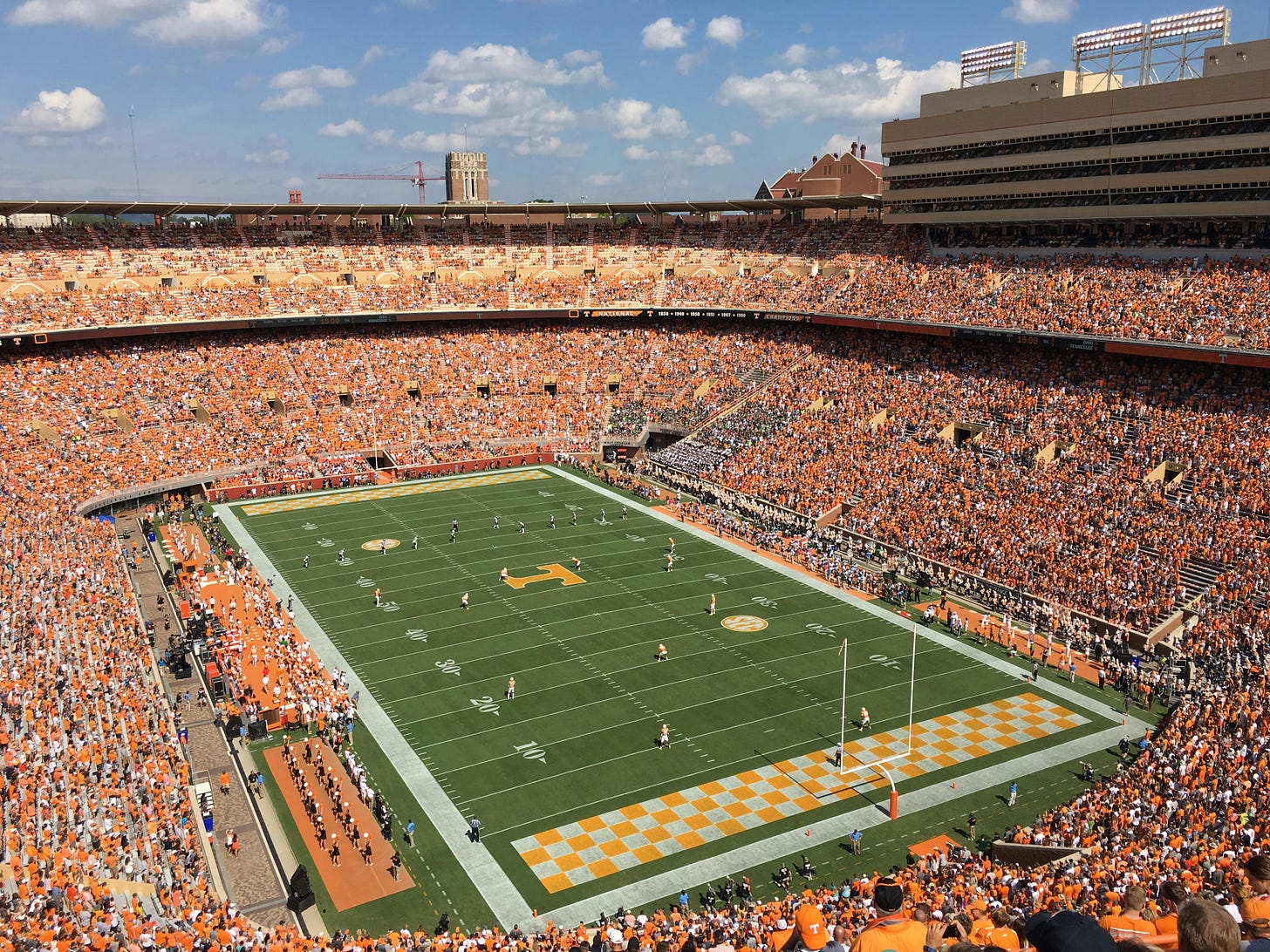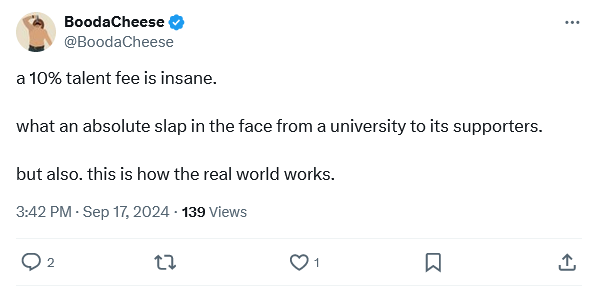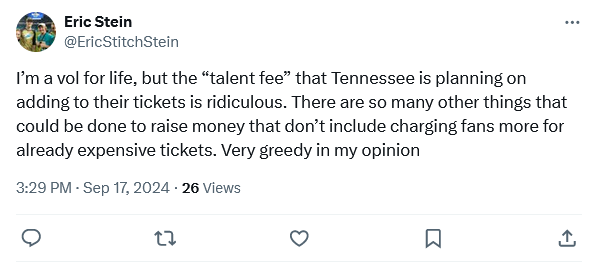Tennessee is doing what with ticket prices?
Why a 'talent fee' surcharge isn't as crazy as you may think

Believe it or not, it’s time for teams to start pushing 2025 football season tickets. But we’re in the middle of September 2024? My friend, the ticket sales machine never rests.
Generally, these early season ticket pushes fly under the radar of everyone except the diehards and the donors desperate to keep their box. But I noticed something funny: Tennessee is adding a new fee to their season ticket package. A 10 percent talent fee, according to The Athletic’s Joe Rexrode.
In a world as somehow both conservative and progressive as college athletics, adding a talent fee has been unheard of. It’s certainly going to ruffle some feathers. But I don’t think it’s too crazy.
What is this fee?
In all reality, the fee is pretty self-explanatory. It’s a 10 percent surcharge on a season ticket package to directly compensate the “talent.” In this case, athletes.
On the surface, that may not seem like a big hike, but Tennessee includes a 4.5 percent year-over-year increase in all of their season ticket packages, meaning the same seat is going to be 14.5 percent more expensive for the 2025 season.
But why is this fee here, you may ask?
To that, I’ll say three words: potential House settlement.
That’s right friends, House v. NCAA is back! If you remember correctly, the proposed settlement (which is now up in the air) included clauses about revenue sharing. This is Tennessee’s attempt to do that.
You can see as much in the email sent from athletic director Danny White to season ticket holders and Volunteer fans. In that message, White claims “This fee will help fund the proposed revenue share for our student-athletes, enabling us to attract and retain the best talent to Rocky Top.”
The Latest in the House saga:
How are fans taking it?
Do you really need to ask that question? Just take a look at some takes I found on Twitter:
I even waded into the VolNation message boards to see how Tennessee’s faithful are reacting, and there’s actually a pretty reasoned take there. It isn’t the talent fee itself that is the problem, it’s that massive 14.5 percent price hike. Especially in the face of a school-record $202 million revenue generation announced in January 2024.
We can even look further into Tennessee’s books to see that their ticketing revenue saw a 13 percent jump from 2022 to 2023, bringing in $39.7 million. Of that lofty number, $31.5 million of it came from football tickets alone, according to Tennessee’s end-of-year financial reports. If we assume just 10 percent of last year’s revenue goes to athletes, we get a $3.1 million revenue share with the football team.
That’s nowhere near the $22 million the proposed House settlement would make schools share with their athletes, but it’s a decent dent without a 14.5 percent price hike. A lot of the outrage coming from fans, like we see in the Tweets above, is because fans are subsidizing the settlement and revenue sharing. In a world where the Tennessee athletic department set records in revenue to the tune of $200 million, why are fans being asked to foot the $22 million bill?
Is this the start of a trend?
In my opinion, this isn’t a simple answer. It’s a yes and no.
Do I think more schools are going to divert some of their ticket revenue to student athletes if the House settlement is approved? Sure, it’s an easy accounting move to cook into the books. But do I think that’s going to be an added fee? We’ll see.
One thing that many who don’t go to games won’t consider is that schools will almost always increase ticket prices year-over-year. For example, Georgia put a $70 hike on their 2025 season ticket package and eliminated the price differential between non-conference and SEC games, according to The Atlanta Journal-Constitution’s Chip Towers. But why was there no outrage aside from the normal grumbling about rising costs? That’s because athletic director Josh Brooks stressed that this price hike is not related to the House settlement. Instead, it’s a normal increase based on market rates.
Tennessee is getting a ton of backlash right now, and some of it is justified. But fans need to understand that athletic departments are scrambling to identify how to revenue share with athletes. Tennessee was just the first to launch their plan and it’s not a bad plan. Diverting a percentage of ticket sales allows equitable distribution across athletic programs based on their individual revenues. But calling that percentage a “talent fee” for fans to pay? That’s where the problem lies.
We’ll see more ideas like this coming out soon as the 2025 fiscal year - when the proposed House settlement would go into affect - approaches. Will some follow Tennessee’s talent fee structure? Sure, especially if the Volunteers see similar season ticket sales numbers as last season. But if those numbers drop, other programs will look to change their plans.
I’m not an athletic director or an accountant, but to me, it makes sense to just divert a percentage of the media revenue for each sport to the athletes. It’s a clean procedure and doesn’t impact the fans at all. Then, a specific athlete-facing donation fund could provide the collective-like payments to give larger schools a larger war chest. But again, I’m not the one making decisions. We’ll have to see how that goes from now on.
What I’m Reading:
: Three-Point Stance is your favorite independent college football newsletter. Come for in-depth analysis and bold commentary, stay for the jokes and memes. An idea hatched after years of 12-hour days glued to the couch, Tyler Schuster puts his passion for the sport on full display, delivering big-picture ideas, weekly previews and gambling nuggets directly to your inbox.An idea hatched after years of 12-hour days glued to the couch, Tyler Schuster puts his passion for the sport on full display, delivering big-picture ideas, weekly previews and gambling nuggets directly to your inbox.
CERNIG by
: Baseball pennant and wild card races are heating up, and Colin’s the one I’m trusting to keep me covered! If you don’t know, I love baseball too, and Colin’s been putting out some great work about players around the league. He writes for Yardbarker a lot, but the content is easy to find on CERNIG and super engaging. by , , and : You can't beat Alex, Richard and Godfrey. They're on the front lines breaking news and creating the best content in the game. I 100 percent recommend SZD for anyone into college football and Steven Godfrey hating your team. They’re mostly a podcast publication, but sometimes being able to listen to three well-informed guys talking about college football is what you need in your life.Have any questions, ideas, article pitches, or information? With the new Substack features, you can directly message me! Hit the button below to send me a message, or reach out via email to sidsports23@gmail.com, or find us on your favorite social media platform like Facebook, Instagram, Twitter, Substack Notes and Bluesky.








Thanks for the shoutout!
I don’t love the fees but professional organizations have been doing things like this for a long time. Not in exactly the same way or for the same purpose but the bottom line always equals more money.
Thanks for breaking this down in a digestible way for the busy college football fan like myself!